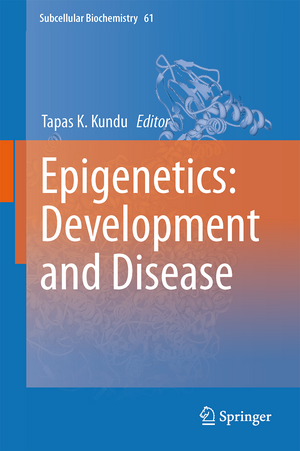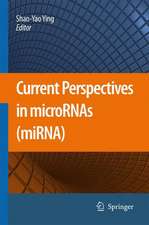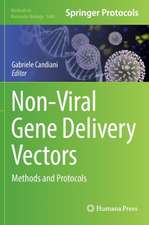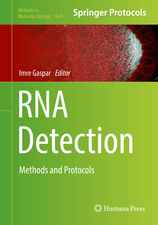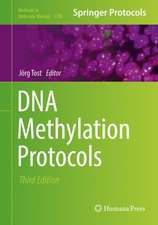Epigenetics: Development and Disease: Subcellular Biochemistry, cartea 61
Editat de Tapas Kumar Kunduen Limba Engleză Hardback – 13 noi 2012
| Toate formatele și edițiile | Preț | Express |
|---|---|---|
| Paperback (1) | 1572.48 lei 39-44 zile | |
| SPRINGER NETHERLANDS – 23 aug 2016 | 1572.48 lei 39-44 zile | |
| Hardback (1) | 1840.74 lei 6-8 săpt. | |
| SPRINGER NETHERLANDS – 13 noi 2012 | 1840.74 lei 6-8 săpt. |
Din seria Subcellular Biochemistry
- 18%
 Preț: 948.79 lei
Preț: 948.79 lei - 5%
 Preț: 1456.88 lei
Preț: 1456.88 lei - 18%
 Preț: 1373.84 lei
Preț: 1373.84 lei - 18%
 Preț: 1243.78 lei
Preț: 1243.78 lei - 18%
 Preț: 2098.81 lei
Preț: 2098.81 lei - 18%
 Preț: 1122.10 lei
Preț: 1122.10 lei - 5%
 Preț: 1160.63 lei
Preț: 1160.63 lei - 18%
 Preț: 1396.26 lei
Preț: 1396.26 lei - 18%
 Preț: 1114.96 lei
Preț: 1114.96 lei - 18%
 Preț: 1224.68 lei
Preț: 1224.68 lei - 18%
 Preț: 951.29 lei
Preț: 951.29 lei - 18%
 Preț: 1227.99 lei
Preț: 1227.99 lei -
 Preț: 398.15 lei
Preț: 398.15 lei -
 Preț: 399.88 lei
Preț: 399.88 lei - 18%
 Preț: 1231.47 lei
Preț: 1231.47 lei - 18%
 Preț: 1230.35 lei
Preț: 1230.35 lei -
 Preț: 392.60 lei
Preț: 392.60 lei - 18%
 Preț: 1231.47 lei
Preț: 1231.47 lei - 15%
 Preț: 638.76 lei
Preț: 638.76 lei - 5%
 Preț: 656.26 lei
Preț: 656.26 lei -
 Preț: 389.49 lei
Preț: 389.49 lei - 5%
 Preț: 659.19 lei
Preț: 659.19 lei -
 Preț: 392.37 lei
Preț: 392.37 lei - 5%
 Preț: 662.09 lei
Preț: 662.09 lei -
 Preț: 395.09 lei
Preț: 395.09 lei - 5%
 Preț: 667.99 lei
Preț: 667.99 lei -
 Preț: 400.47 lei
Preț: 400.47 lei - 18%
 Preț: 1224.54 lei
Preț: 1224.54 lei - 15%
 Preț: 647.73 lei
Preț: 647.73 lei - 15%
 Preț: 646.75 lei
Preț: 646.75 lei - 5%
 Preț: 662.30 lei
Preț: 662.30 lei -
 Preț: 395.25 lei
Preț: 395.25 lei - 18%
 Preț: 1230.21 lei
Preț: 1230.21 lei - 18%
 Preț: 1231.95 lei
Preț: 1231.95 lei - 18%
 Preț: 964.54 lei
Preț: 964.54 lei
Preț: 1840.74 lei
Preț vechi: 2244.81 lei
-18% Nou
Puncte Express: 2761
Preț estimativ în valută:
352.23€ • 368.50$ • 292.60£
352.23€ • 368.50$ • 292.60£
Carte tipărită la comandă
Livrare economică 03-17 aprilie
Preluare comenzi: 021 569.72.76
Specificații
ISBN-13: 9789400745247
ISBN-10: 9400745249
Pagini: 600
Ilustrații: XXVI, 689 p.
Dimensiuni: 155 x 235 x 32 mm
Greutate: 1.13 kg
Ediția:2013
Editura: SPRINGER NETHERLANDS
Colecția Springer
Seria Subcellular Biochemistry
Locul publicării:Dordrecht, Netherlands
ISBN-10: 9400745249
Pagini: 600
Ilustrații: XXVI, 689 p.
Dimensiuni: 155 x 235 x 32 mm
Greutate: 1.13 kg
Ediția:2013
Editura: SPRINGER NETHERLANDS
Colecția Springer
Seria Subcellular Biochemistry
Locul publicării:Dordrecht, Netherlands
Public țintă
ResearchCuprins
PART I: EPIGENETICS AND EVOLUTION.- 1.1 Chromatin Organization, Epigenetics and Differentiation: An evolutionary perspective.- 1.2 Secondary structures of the core histone N-terminal tails: their role in regulating chromatin structure.- 1.3 Megabase replication domains along the human genome: Relation to chromatin structure and genome organization.- 1.4 Role of DNA methyltransferases in epigenetic regulation in bacteria.- PART II: DEVELOPMENTAL EPIGENETICS.- 2.1 Metabolic aspects of epigenome: Coupling of S-adenosylmethionine synthesis and gene regulation on chromatin by SAMIT module.- 2.2 Epigenetic regulation of male germ cell differentiation.- 2.3 Epigenetic Regulation of Skeletal Muscle Development and Differentiation.- 2.4 Small changes, big effects: chromatin goes aging.- 2.5 Homeotic gene regulation: A paradigm for epigenetic mechanisms underlying organismal development.- PART III: EPIGENETICS AND TRANSCRIPTION REGULATION.- 3.1 Basic mechanisms in RNA Polymerase I transcriptionof the ribosomal RNA genes.- 3.2 The RNA polymerase II transcriptional machinery and its epigenetic context.- 3.3RNA polymerase III transcriptions - regulated by chromatin structure and regulator of nuclear chromatin organization.- 3.4. The Role of DNA Methylation and Histone Modifications in Transcriptional Regulation in humans.- 3.5 Histone variants and Transcription regulation.- 3.6Noncoding RNAs in Chromatin Organization and Transcription Regulation: An Epigenetic View.- 3.7 Chromatin structure and organization: the relation with gene expression during development and disease.- PART IV: EPIGENETICS AND DISEASE.- 4.1 Epigenetics and cancer: Development, Differentiation and Pathobiology.- 4.2 Epigenetic Regulation of Cancer Stem Cell Gene Expression.- 4.3 Role of Epigenetic Mechanisms in the Vascular Complications of Diabetes.- 4.4 Epigenetic changes in inflammatory and autoimmune diseases.- 4.5 Epigenetic regulation of HIV-1 persistence and evolving strategies for virus eradication.- 4.6 Epigenetics in Parkinson’s and Alzheimer’s diseases.- 4.7 Cellular Redox, Epigenetics and Diseases.- PART V: UNDERSTANDING OF EPIGENETICS: A CHEMICAL BIOLOGYAPPROACH AND EPIGENETIC THERAPY.- 5.1 Stem cell plasticity in development and cancer: Epigenetic origin of cancer stem cells.- 5.2Histone acetylation as a therapeutic target- Implication of nanodelivery.- 5.3 DNA methylation and Cancer.- 5.4 Role of epigenetics in inflammation-associated diseases.- 5.5 Plasmodium falciparum: Epigenetic control of var gene regulation and disease.
Textul de pe ultima copertă
Epigenetics is the phenomenon which fine tunes the processes associated with life, beyond that which is specified by the sequence of the genetic material; DNA. The covalent modification of DNA, DNA associated histones, several non histone proteins as well as non coding RNA coherently operate to establish the epigenetic regulation of gene expression in physiological and pathophysiological conditions.
This volume presents contributions from worldwide experts presenting their research and findings, including: the evolution of epigenetic machineries from archaea to higher eukaryotes; role of epigenetics in development and transcription regulation; epigenetic landscape of human disease; a chemical biology approach to understanding epigenetic phenomena; exploration of different small molecules as epigenetic therapies.
This volume is aimed at students and researchers of chromatin biology and epigenetics and will also be of interest to a broader pharmaceutical audience.
This volume presents contributions from worldwide experts presenting their research and findings, including: the evolution of epigenetic machineries from archaea to higher eukaryotes; role of epigenetics in development and transcription regulation; epigenetic landscape of human disease; a chemical biology approach to understanding epigenetic phenomena; exploration of different small molecules as epigenetic therapies.
This volume is aimed at students and researchers of chromatin biology and epigenetics and will also be of interest to a broader pharmaceutical audience.
Caracteristici
Role of genome organisation as a basic platform of different epigenetic phenomena in the pathophysiological context Epigenetic regulation of transcription Epigenetic contribution in development Epigenetic mechanisms of important diseases such as diabetes, AIDS, Alzheimer?s disease, malaria and cancer Furthermore, the book has also revealed the epigenetic phenomena as target of new generation therapeutics
